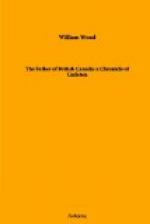On the 19th of May another disaster happened, this time above Montreal. The Congress had not felt strong enough to attack the western posts. So Captain Forster of the 8th Foot, finding that he was free to go elsewhere, had come down from Oswegatchie (the modern Ogdensburg) with a hundred whites and two hundred Indians and made prisoners of four hundred and thirty Americans at the Cedars, about thirty miles up the St Lawrence from Montreal. Forster was a very good officer. Butterfield, the American commander, was a very bad one. And that made all the difference. After two days of feeble and misdirected defence Butterfield surrendered three hundred and fifty men. The other eighty were reinforcements who walked into the trap next day. Forster now had four American prisoners for every white soldier of his own; while Arnold was near by, having come up from Sorel to Lachine with a small but determined force. So Forster, carefully pointing out to his prisoners their danger if the Indians should be reinforced and run wild, offered them their freedom on condition that they should be regarded as being exchanged for an equal number of British prisoners in American hands. This was agreed to and never made a matter of dispute afterwards. But the second article Butterfield accepted was a stipulation that, while the released British were to be free to fight again, the released Americans were not; and it was over this point that a bitter controversy raged. The British authorities maintained that all the terms were binding because they had been accepted by an officer commissioned by the Congress. The Congress maintained that the disputed article was obtained by an unfair threat of an Indian massacre and that it was so one-sided as to be good for nothing but repudiation.




